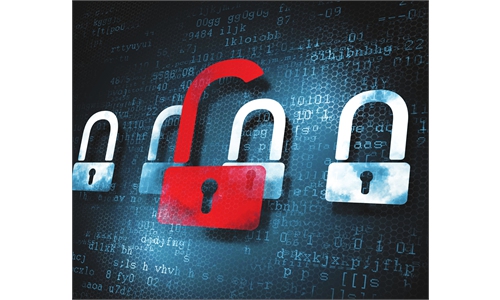
Cyberattacks Photo: VCG
Paul Nakasone, the Commander of US Cyber Command and Director of the National Security Agency, noted recently in a testimony before the US Senate that before the outbreak of the Russia-Ukraine conflict, the command “supported” Ukraine in cyberspace. After the outbreak, the US reinforced its “hunt-forward” operation and helped Ukraine strengthen its cyber defense. In fact, the US interference in the crisis through cyberspace is much more than just helping Ukraine with its defense, the US is also supporting it against Russia on all fronts, including cyber offense and defense, information awareness, digital connectivity and cyber intelligence, setting several extremely dangerous precedents.
The first precedent is cyber warfare between nuclear-weapon states. Since the beginning of the Russia-Ukraine conflict, the US has repeatedly stressed that it will not be engaged in an armed conflict with Russia and has refrained from establishing a no-fly zone and test-launching intercontinental ballistic missiles. This indicates US clear understanding of the possibility of escalating the situation and even triggering a nuclear war with Russia. However, at the same time, the US is confronting Russia head-to-head in cyberspace even at the frontline. The reason is that the US believes it can unilaterally control the scale and consequences of cyber conflict with its technical superiority. However, as the Internet has gone deep into all aspects of social life, the width and depth of the impact of cyber warfare may be beyond the control of any country.
In the context of a hot war, situations won’t exactly follow the US script that whether engagement in cyberspace would be considered armed engagement or whether it would provoke another nuclear weapon state to escalate the conflict. Against the backdrop of Russia’s announcement to raise its nuclear preparedness and unspecified cyberattacks on Russian nuclear facilities, US direct engagement in cyber conflict with Russia will easily lead to a strategic miscalculation. The Russian Foreign Ministry condemned the US and NATO in a statement for waging a cyber war against Russia involving a broader scale of hackers. This is a stern warning against the US’ “dangerous game” in cyberspace which would possibly trigger a conflict between nuclear-weapon states.
The second precedent the US sets is a proxy war in cyberspace. The US uses China and Russia as imaginary enemies to promote its cyber strategy of “hunt-forward” and “persistent engagement.” The US is deeply involved in building the cyber power of Ukraine, using it as a bridgehead for close reconnaissance, network penetration and cyber attacks against Russia, preparing for its cyber confrontation with Russia. Apart from Ukraine, the US is also doing the same in the Asia-Pacific region, hyping China’s cybersecurity threats to China’s neighbors and thus luring them into “cybersecurity cooperation” in an attempt to bring the US cyber tentacles to China’s doorstep. This is similar to US intention of deploying its missile and anti-missile systems in the vicinity of China and Russia, which not only enhances the US deterrence and offensive capabilities, but also takes the opportunity to force China and Russia’s neighboring countries to the US’ chariot.
The tragedy in Ukraine is a lesson to be learned. For the US, there will be a greater security dilemma with the pursuit of its own absolute security in spite of security concerns of others, or even at the cost of others’ insecurity. With good intentions to strengthen cyber security and cooperation with the US, regional countries not only failed to enhance their own security, but also put themselves in the vortex of competition between major powers, and even became cannon fodder for major power confrontation.
The third precedent has been set for non-compliance with international rules. The US clamors that cyber attacks constitute armed attacks, and pushed NATO to declare for the first time at its 2021 summit that "significant malicious cumulative cyber activities might, in certain circumstances, be considered as amounting to an armed attack.” But the US launched such cyber activities that should be defined by itself as “armed attacks” against Russia. The US underlines that all offline rules apply online as well, fabricating cyber attacks charges, accusing other countries and abusing sanctions. At the same time, the US sees the digital world as a "land beyond law," and does not hesitate to attack other countries' critical infrastructure. While advocating democracy, freedom and human rights and opposing information manipulation and disinformation, the US cut off the Internet services for Russia, blocked Russia’s voice, and spread disinformation against Russia without limits, in a bid to confuse the public. Behind these actions is the arrogance of the US and its blatant double standards for international rules.
Coincidentally, the US completely ignored the international consensus reached last year of “developing and implementing globally interoperable common rules and standards for supply chain security,” in the UNGGE report, and deliberately created closed and exclusive small circles to discuss supply chain issues for geopolitical purposes.
What the US wants has never been universally applicable international rules in cyberspace, but "domestic laws" and "rules of its small gang" to serve its own selfish interests. The “framework for responsible State behavior” which the US claimed to adhere to only holds other countries accountable, and the US itself is above international rules. Washington’s practices of disregarding international rules have severely interfered with the efforts of the international community to establish order in cyberspace, and may even lead to serious consequences of a collapsed order.
Cyberspace is a common space shared by all countries. The US should stop “playing the touch ball” in cyberspace. Instead, it is supposed to shoulder the responsibility of a major power, avoid strategic misjudgments, and earnestly maintain strategic stability among major powers and build a peaceful and secure cyberspace.
The author is an observer on international affairs. opinion@globaltimes.com.cn


